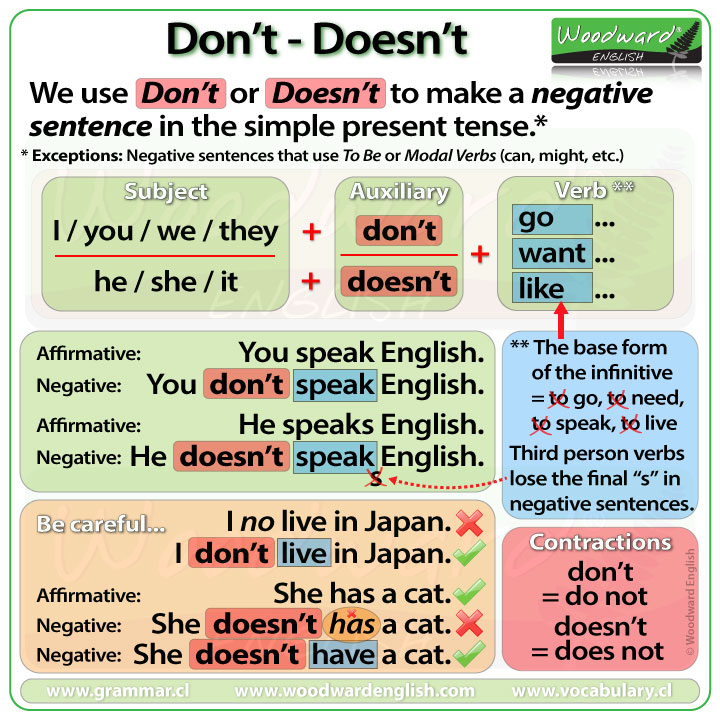It Doesnt Make Sense to See Him Again I Dont Know
Don't and Doesn't in English
- You lot speak English.
This is an affirmative (or positive) sentence.
How can we make this affirmative judgement (+) a negative judgement (-)?
- Yous speak English. (+)
- Y'alldon't speak English language. (-)
We do non say: I no speak English. (Non correct)
We say: Idon't speak English. (Right)
We ordinarily employDon't orDoesn't to make a negative sentence in the uncomplicated present tense.
Let'southward await at the difference between DON'T and DOESN'T.
DON'T – Negative Sentences with DON'T in English
We employDon't when the discipline isI,you,we orthey. We add togetherdon't between the subject and the verb.
I speak English language.
Idon't speak English.
You speak Spanish.
Youdon't speak Castilian.
Nosotros speak French.
Wedon't speak French.
They speak Arabic.
Theydon't speak Standard arabic.
Y'all see that don't makes the sentence negative when the bailiwick is I, You, Nosotros or They.
DOESN'T – Negative Sentences with DOESN'T in English
Now let'southward wait at third person sentences using he, she and it. Again, nosotros adddoesn't between the subject and the verb to make a negative sentence.
- He speaks Spanish. (+)
- Hedoesn't speak Spanish. (-)
Notice how the letterS at the terminate of the verb in the affirmative sentence (because information technology is in third person) disappears in the negative sentence.
Why does this happen?
The verb after the negative don't or doesn't is the base form of the infinitive.
Remember, the infinitive is the verb before it is changed. To become, To need, To speak, To live … these are all infinitives which ways that they are the original form of the verb earlier any changes. We know they are in the infinitive form because of the TO at the beginning.
But for negative sentences we want the BASE course of the infinitive. This means the infinitive without TO. Instead of To become, information technology is merely go. Instead of To speak, information technology is just speak.
- He speaks Castilian. (+)
- Hedoesn't speak Castilian. (-) (no Southward at the end of speak)
Third person verbs lose the final S in negative sentences.
Another case:
- She speaks Italian. (+)
- Shedoesn't speak Italian. (-)
Again you tin see that in the negative sentence, speak does not take an South at the end because it is the base form of the infinitive.
Let'due south see a couple more examples:
- Phillip needs a lexicon.
What is the negative of this? - Phillip doesn't demand a lexicon.
(No Due south at the stop of the verb Demand)
- The dog wants a bone. (+)
What is the negative of this? - The dog doesn't want a bone. (-)
(No S at the end of the verb Want)
Negative Sentences with Have and Become
Now allow's await at some verbs that modify a little more.
The offset 1 is the verb To Take .
- I have a new bike.
What is the negative of this? - I don't have a new bike.
The infinitive is To Accept just we merely need its base form … accept.
But allow'due south look at the third person, for example with He.
- He has a new bike.
What is the negative of this? - He doesn't take a new bike.
Nosotros NEVER say: he doesn't has a cycle.
Why exercise we use Have in the negative and non HAS?
Considering the verb after don't or doesn't is the base of operations class of the infinitive.
The infinitive of has is To have.
The base of the infinitive is have (without the TO at the beginning)
- He doesn't have a new bike.
Permit's brand negatives sentences with the verb To Become.
To Go is the infinitive. Its base of operations course is simply Go.
- I go to the beach. (What is the negative class of this?)
- I don't become to the beach.
- Daniel goes to the beach.
Goes is used with he, she, or it. Daniel is He.
How can I change this to a negative sentence? - Daniel doesn't go to the beach.
Become considering it is the base form of the infinitive.
We utilize Don't and Doesn't to make negative sentences in the simple present tense EXCEPT with the verbTo Be andModal verbs such every bit can, might, should etc. which we will see in some other lesson.
Be careful…
We don't say: I no live in Japan. This is Non correct.
We say: I don't live in Japan. This is correct.
Nosotros say: She has a cat.
We practise not say: She doesn't has a cat. This is Non correct. We need the base of operations class of the infinitive which is Have and non has.
The correct manner is: She doesn't have a cat.
Contractions
Don't =Practise not
Doesn't =Does not
- Idon't speak Japanese. = Ido not speak Japanese.
- He doesn't speak Korean. = He does not speak Korean.
There is no difference in meaning though we use contractions a lot in spoken English.
Practice Activity
Complete the following sentences with don't or doesn't.
- I live in a house. I _______ live in an flat.
- She _______ like spiders.
- You _______ demand a lexicon.
- Nosotros _______ have cake for breakfast.
- Information technology _______ rain much in summer.
- Jack and Jill _______ desire to become up the hill.
- Mike lives in New Zealand. He _______ live in Australia.
The answers appear in the video.
Don't vs. Doesn't – Practice Video
Summary Chart

Source: https://www.woodwardenglish.com/lesson/dont-doesnt-english-present-tense-negative-sentences/
0 Response to "It Doesnt Make Sense to See Him Again I Dont Know"
Post a Comment